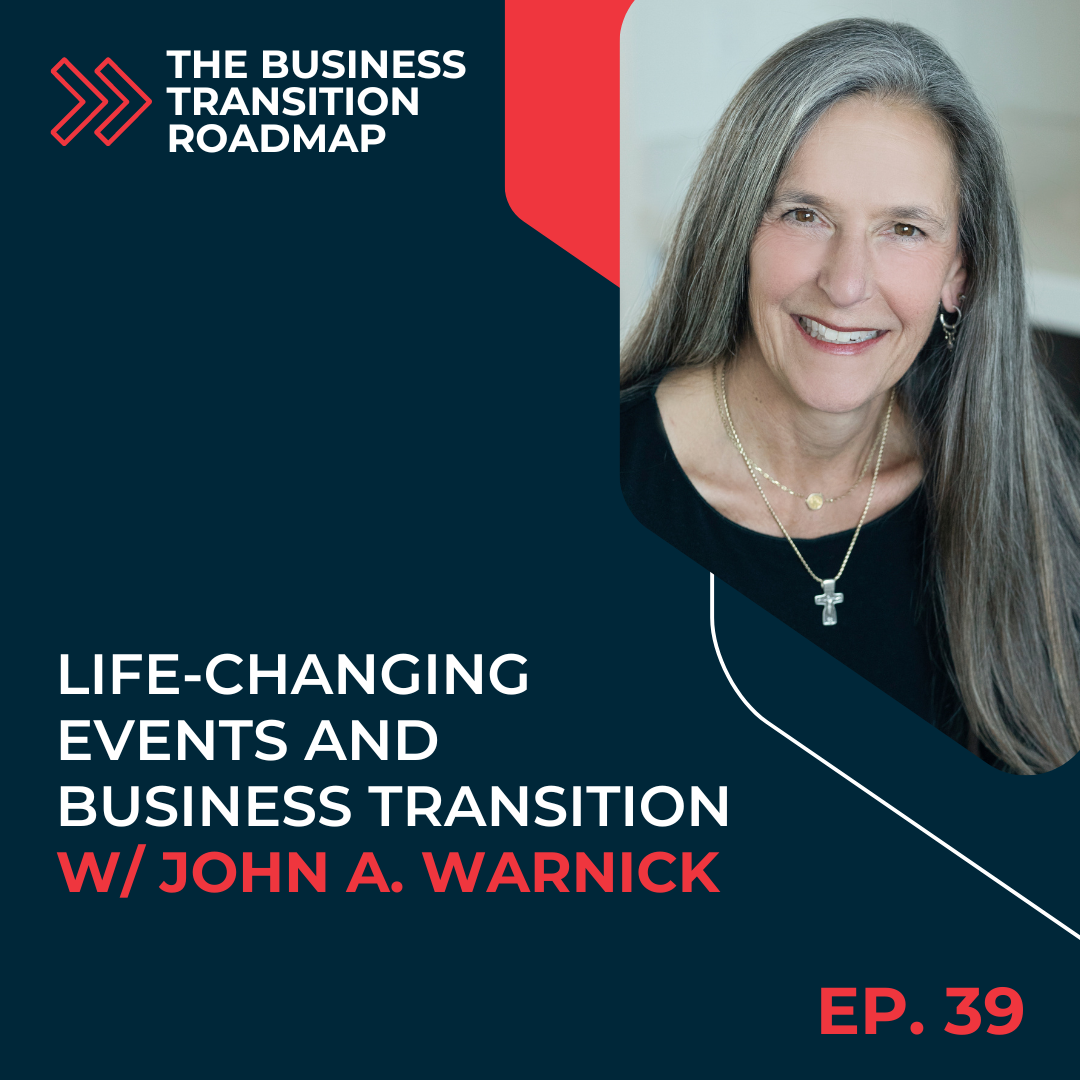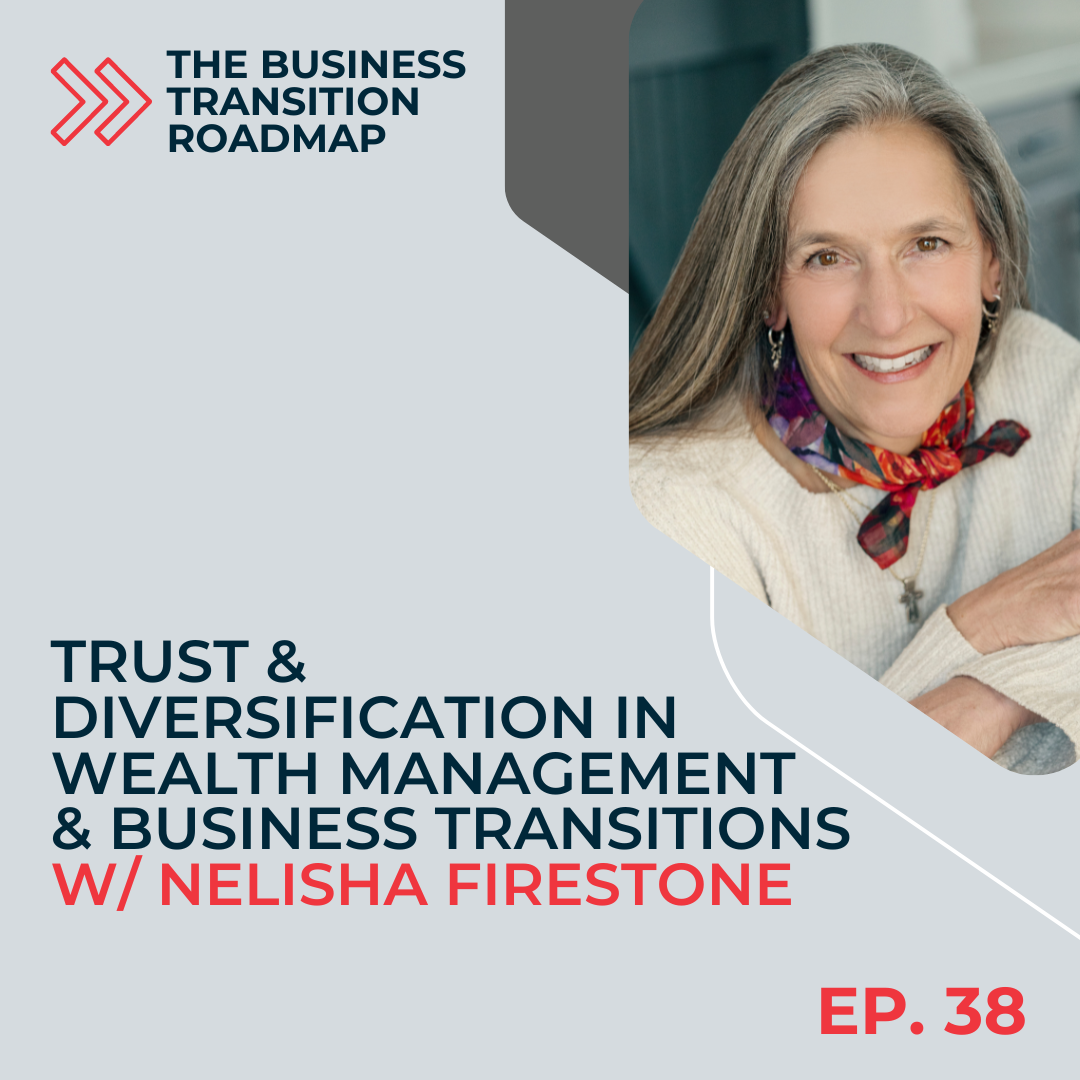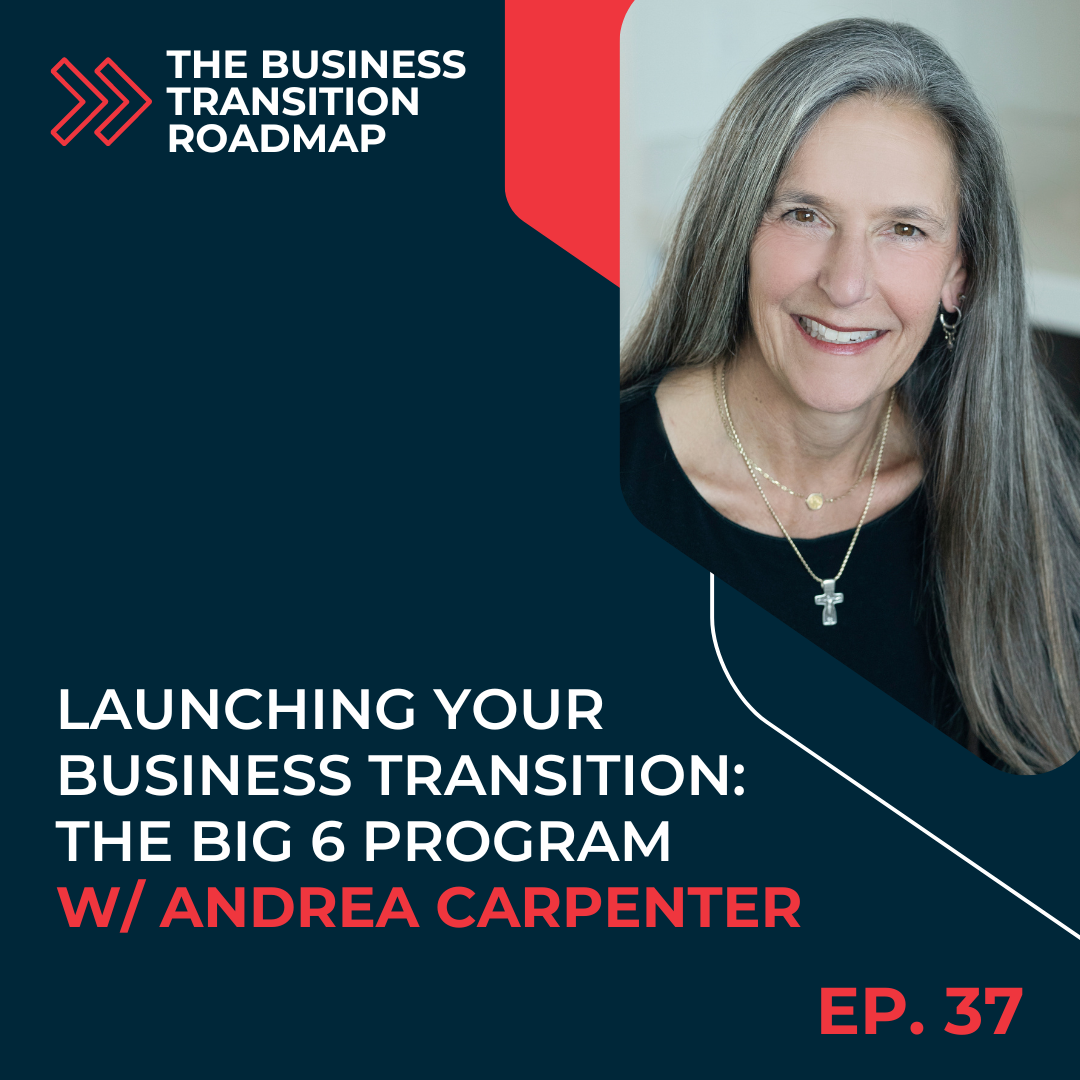Episode Description:
There is always a fear that surfaces when a business transition begins. Owners fear that employees will lose confidence in them and leave the company or that the company will start to crumble if people get the wrong idea of where the transition is going. Employees fear that they’ll be left in the dark and that a new owner or new management will change their status quo in a way they don’t like. So how do we overcome our fear as owners and keep our employees calm in a time of uncertainty? Tap or click the play button below to listen to: 5 Communication Tips for Owners Contemplating Transition
In this episode, Elizabeth discusses the fear that almost every business owner has when it comes to communicating about their business transition. She’ll talk about where these fears come from, and offer up 5 solutions that will help you to talk to and communicate with the people within your business, and also potentially even outside of the business as you go through your transition journey.
Connect with Elizabeth and the Transition Strategists:
Website: https://transitionstrategists.com/
Facebook: https://www.facebook.com/thetransitionstrategists
LinkedIn: https://www.linkedin.com/company/transitionstrategists/
This episode was produced by Story On Media & Marketing: https://www.successwithstories.com.
5 Communication Tips for Owners Contemplating Transition Transcript
[00:00:00] Elizabeth Ledoux: Hi, and welcome back to the podcast. Today what we’re gonna talk about are five communication tips that owners who are contemplating transitioning outta their businesses, um, might be able to use. So five tips that will help you to talk to and communicate to potential people within your business, and also potentially even outside of the business.
[00:00:24] In general, owners fear communicating about a transition. Um, reason why is because it’s scary. There’s a lot of fear in it. Um, you know what, if people think I’m leaving and I’m not gonna take care of him anymore, and what if they leave the company because they lose confidence in me. And what if they’re fearful about what their future’s gonna be like?
[00:00:49] And they don’t wanna stay with this new owner, so they start to bail on me. Um, what happens if they don’t like what I’m doing? Lots of fear in that conversation because there’s a lot of loss, right? What you’ve worked so hard to build and keep together. One conversation could. Start the whole thing crumbling might be slowly crumbling, but it starts the whole thing because people start to question what’s gonna happen, right?
[00:01:19] Status quo is not gonna be status quo anymore. There’s change coming. We also have some fear behind, I think communicating just because. Business owners are used to hearing the stories of not communicating because of merger acquisition type things. So when businesses go to sell to a third party, um, not an internal successor, so not like another partner or set of partners, not a set of employees or one employee, not to family members, but they go to sell to a third party that they don’t know and they go out to market.
[00:01:57] Those deals are typically done with, um, non-disclosure agreements, so NDAs, so people go and they, you know, put together a package merger acquisition people, they put that out into the market. Everybody signs an NDA who’s interested, and then there’s a lot of information that gets passed because it’s a third party.
[00:02:16] So that NDA happens. That’s a bigger transition. Typically, more change happens within the company when that, when you go out to a third party and, um, many times the only time the employees and others find out about it is at the champaign celebration after the deal is done and signed and closed. So in general, what I’ve found is owners fear communicating about transition in any way.
[00:02:46] If you’re doing an internal transaction or an internal transition, and that’s your true desire to be able to do that. I think that that is very dangerous for you not to communicate. And so getting over your own fear and figuring out how you’re gonna do that is part of the journey of understanding how you’re gonna get this internal transaction done.
[00:03:10] Ultimately, again, whether it’s two years, five years, 10 years, that’s your goal. So my five tips for. Communicating with people and getting the ball rolling. Since you have a long runway, right, you’ve, it’s a journey. So you’ve got this long succession transition runway. Um, it’s hard to keep it a secret for very long.
[00:03:34] You need to actually engage people and bring them in to help you. . So my five tips, um, first one is know your direction. You don’t have to have all of the answers to everything figured out. And in fact, you won’t have all of the answers figured out. There’s no possible way that you’re gonna be able to do that.
[00:03:52] Um, we can’t predict the future. And the other thing that we can’t predict is the people and what they’re gonna do in our. We don’t know exactly what our successors are gonna be doing, so you have to know your direction. I’ll give you a story. It was a client up in Canada that I worked with. Um, wonderful firm had two people who, um, owned it and two other people who had come in as minority owner successors, and they were all on track.
[00:04:21] They knew that they wanted to transition it to an insider group, so they had two people they’d selected, they’d already brought them in. For ownership and they had agreed, so they’d been invited and what happened is one of the successors fell in love. And his wife to be, wanted to live in Vancouver instead of this small town in British Columbia.
[00:04:45] And guess what? He moved, he left. So you are not gonna know all the answers, and it’s not gonna be quite perfect with your vision, but you have to know your direction. You have to know in general what you want. So that would be the first thing that I would give you as a tip, is no kind of what you’re looking for.
[00:05:03] Second one is positioning, positioning, positioning. When you go in to talk. To somebody about your transition, and if it’s a potential successor, let’s say, let’s take that example. Uh, you need to go in with mindfulness. What do you want to get out of this conversation? Who are you talking to? What kinds of things might they perceive or be fearful of?
[00:05:37] And how are you going to navigate that, uh, and help them to understand not to be afraid. So, one, you’re not afraid. a little bit. Maybe two though. What you’re doing is going in with an intent, positioning it the way that you need to, and then thinking about how are you gonna help them to understand and not become fearful?
[00:06:01] Cuz that goes back to the first thing that we’re always fearful about, talking about our transitions and what others might think about it or do. So second one, positioning, positioning, positioning. Uh, third one. I, I actually do love fly fishing, and so I love doing that, but I also love conversational fishing, so I call it let’s go fishing.
[00:06:27] Communication with intent, of course, because you’re the guide. But let’s imagine that we’re in the conversation. So, um, we figured out our direction, what we want in our overall transition. So we have a concept, um, may not be set in stone, but we have a concept of what we’d love. Love to achieve. We’ve positioned it in our heads and, and even maybe on paper of, you know, what you’d like out of the conversation and how you’d like the conversation to end up, how you would like the other person to feel and know what you want them to know.
[00:06:59] Now what we’re gonna do is have this fishing conversation and. The goal of it is to understand their desires or their perception of it, or gain some knowledge. Because if you’re even thinking about inviting ’em in, some people will, some owners will say, oh, well, I’m gonna get it all figured out and I’m gonna understand exactly what it is that we’re gonna do, and then what I’m gonna do is go tell them how they’re gonna become an owner.
[00:07:29] I’m gonna tell ’em exactly how it’s gonna work. Assumption there is, they wanna be an owner. You, uh, you think everybody would wanna be an owner, of course. But it’s, uh, pretty, it’s a pretty big ask to be an owner and to live that life, especially when you’re taking care of so many people and have so much influence on a community.
[00:07:49] So the goal is to understand their desires, get their perspective. The only way you do that, truthfully, is to keep somebody where they’re not being defensive. So if I’m not able to have this fishing conversation and attract them to me because they’re curious, they’re interested, they want to know, they wanna know more, they feel special that I was, that they were important enough or, um, You know, made a big enough impact on me as the owner to include them.
[00:08:27] This is a very important conversation to start, even though it might only be a few minutes long, could be 15 or 20 minutes, we don’t know. So these fishing conversations are wonderful and we wanna make sure that they don’t get defensive. If they’re defensive, you won’t get true information. If they’re curious, you’ll get a lot of information.
[00:08:50] So I love these fishing conversations. Fourth point, their fourth tip is this is an invitation to become a part of the business at a higher level, potentially equity level. Um, so asking them when you get that far, uh, asking them, so let’s go back to the fishing conversation. I could do something like this as an example.
[00:09:17] I could say, Hey, um, you know, I’ve been thinking about this business and I’ve been thinking about me and I’ve been thinking about my next adventure, and we have such amazing people here who really are running the business so well that I’ve been thinking about. Um, Maybe transitioning and what that might look like over the next five to 10 years.
[00:09:36] I don’t have any ideas really. Not foundational, but I’ve been starting to think about what would happen if, if I could actually transition this to maybe some employees or somebody that I know who I know would take this business and nurture it and keep it thriving going forward, and. You know, keep the town healthy and keep doing some of the things that we love doing as a community, as a, as a business.
[00:10:04] Have you ever thought about what it would be like to be an owner? Have you ever thought about being an owner? Has that ever been an aspiration of yours? I’m just checking it out because you’ve been just amazing in this business and, um, you mean a lot to me. So it’s kind of an interesting thought because it.
[00:10:23] It’s just a fishing conversation and you didn’t tell ’em that they were gonna be a partner. You just were fishing around to see if they’ve ever thought about it. And sometimes you’ll be surprised. We had a, we had a client in here the other day. We were talking about the fishing, we were talking about the invitation, and he’s a lot closer to actually having the invitation conversation.
[00:10:48] So he is kind of past the fishing, but he’s getting close to needing to do this invitation. And we were talking to him and he just looked at us. He’s got four people that he’s thinking about talking to, um, that he would like to have as people who would be successors and owners with him. We were talking about it and he looked at me and he goes, what if I have four nos?
[00:11:12] And I thought, wow, that’s an interesting thought. As owners, you know, we believe that anybody that we would invite into ownership would be more than happy to come and excited because it’s such a wonderful opportunity. However, some people aren’t excited. It’s not in their d n a to be an entrepreneur owner, and.
[00:11:34] They don’t tolerate the risk very well. They’re not that entrepreneurial and not that person. So the invitation, um, for tip, the invitation, it’s an ask, it’s not a tell, it’s not a demand. I’d like to make that point even more focused. When we’re talking about kids or talking about family. Uh, it is absolutely an ask with your children.
[00:12:02] And it is so wonderful to be able to clearly ask them to come in and say, Hey, would you like to come in to this? And this is what it would look like and this is how it would feel, and this is how we would operate together instead of, you’re gonna be the next owner. Fifth tip is embrace your fear. So some of these conversations are going to be frightening.
[00:12:30] Um, I keep you up the night before. Might, you might put it off a few times. You might find another way to do it. The worst one I’ve ever had. Um, it was very interesting, but we got hired by a woman who had a woman partner and their partnership was not going well, and she needed and wanted to buy out this partner, but she’d been thinking about it for about four or five years, and she could not bring herself to have the conversation that she would like to purchase.
[00:13:08] Right, just an internal transition. Purchased the business from her partner because their partnership wasn’t going well and she just could not bring herself to do that. So what we ended up doing is she wrote a letter and. That was how she embraced her fear. She wrote the letter, we designed the letter.
[00:13:31] She gave her partner the letter, which launched the whole transition, and it took about six months to get through it, but it was the first piece that had to happen. So again, just an internal transition. She just happened to be the successor and shows she teed that up for this particular thing. So anyway, you have to embrace your fear.
[00:13:54] Because it, whatever is there exists, uh, it’s not really okay for like our client to go down the whole road of thinking that all four of his PO potential successors are gonna come into this business. And then to find out at the last minute, A year and a half of planning, or a year and a half of thinking about it, the excitement that he would have of saying, man, I can’t wait to tell them that it’s gonna be great, and they’re gonna all get to be owners.
[00:14:29] And then to have one or two of ’em say no. That’s not really for me. He could have spent that last year and a half designing it and bringing in people who would then create the rest of his plan. Cuz sometimes the, it’s like a piece, it’s like puzzle pieces and other people you don’t control them. And they don’t control you, but you have to interact and you want to meet their desires cuz otherwise they’re not gonna do well in this succession and your business won’t do well either.
[00:15:02] Your people won’t do well going forward. So embrace your fear. So today we talked about five communication tips for owners contemplating business transition. Know your direction, position, position, position. Go fishing and have fun doing it. This is an invitation, so make it an ask and embrace your fear. My thought for you to end this is I’d like for you to reflect a little bit on how well you know your direction and what’s keeping you from knowing that direction.
[00:15:42] Who do you need to go start to talk to that might help you to understand? This whole succession part, so how it might work and what they might want. Again, not making any promises, but starting the conversation because your employees and your partners know that as you get into your fifties and your sixties.
[00:16:07] And I’m about ready to have my 60th birthday, so that’s gonna be a lot of fun this fall. But as you get into that time, They start to wonder what’s gonna happen to this business, how it’s gonna work going forward? Are they safe? Should they be looking for another position? And all those other things, they’re, they’re thinking all of that by starting these conversations and by doing this work and figuring out what you want to do, you’re actually.
[00:16:35] Doing probably one of the most rewarding things you’re gonna do in your entire career, which is helping others to continue on while you stop at some point in time. So thanks for coming, and we’ll talk to you next time.
The Business Transition Roadmap with Elizabeth Ledoux
How do communities thrive? When businesses experience healthy growth and transition. Join CEO of The Transition Strategists, Elizabeth Ledoux as she and her guests identify what makes a successful business transition roadmap. If you know you want to transition or exit your business “one day”, today is the right day to start planning. This show will give you the roadmap.




